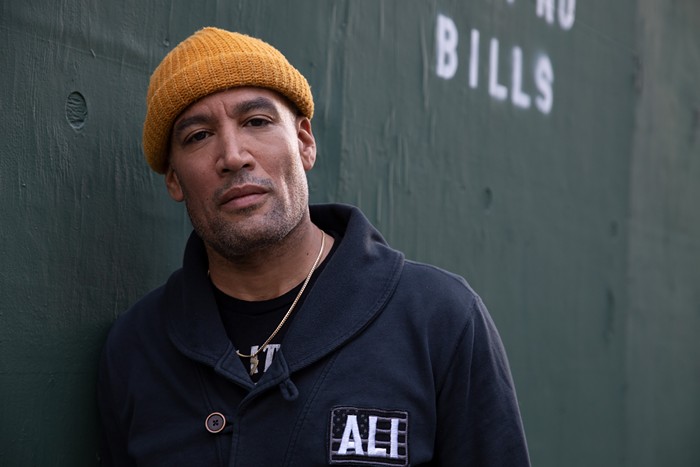It's not confusing--and one woman's "doing too much" is another woman's inspiration--but you can't fault the Mecca Normal singer for asking. The duo's current tour supporting their tenth record, The Family Swan, is a menagerie of Smith and guitarist David Lester's work over the past 18-plus years. Besides playing their strange and beautiful music, they'll be exhibiting art (Lester's political posters, Smith's paintings and self-portraits, Nikki McClure's papercuts), selling Smiths' novels, and putting on a workshop entitled, "How Art and Music Can Change the World." What might seem egregious from a less focused band is striking and monumental from Mecca Normal, who have been staples of radicalism (politically and musically) in the Pacific Northwest.
To clarify, however: to base reverence in Mecca Normal for sheer longevity would be bullshit. They deserve to be revered because their music has never ceased being dangerous and frightening, awkward and thought provoking, and uncomfortable in its honesty. Lester plays raw, spare electric guitar, while Smith spouts forth linear, visceral lyrics in a disarming, scratchy, shapeshifting wail. It's unsettling. A lot of people don't like it. An equal amount of people love it, however, but there's no middle ground--reactions are always violently one way or the other.
Often, though, people who previously disliked Mecca Normal's music will have a revelation. Smith explains, "People write to us calling themselves 'converts.' If a song catches you at a time when it is meaningful to you, it can feel appropriate until that time, maybe Mecca Normal is that feeling in the back of your mind that you'd prefer to keep pushing away. The Family Swan is appropriate for my life, right now. It's an album of facing up to things that have been difficult I appreciate life more having been through painful experiences."
Specifically, The Family Swan was made in the wake of Jean's newfound sobriety (she began drinking when she was 13) and delving into the harmful dynamics of relationships. So in a sense, it's a healthy record, although the unbridled realism Smith expresses takes great courage. "To reveal vulnerability is scary. It doesn't make one feel secure to say what things are painful, unless it is to someone you trust. To change as a person, and to continue revealing how I am, and what I've learned, is uncomfortable," she explains. "When I turned 40, quit drinking, and became single, I got down to the work I'd be putting off for most of my life I chose to be alone, to be separate from my parents, to fix some things in myself. That's a lot to write about, but it isn't typically what rock music puts forward. So, of course, that inspired me."


















